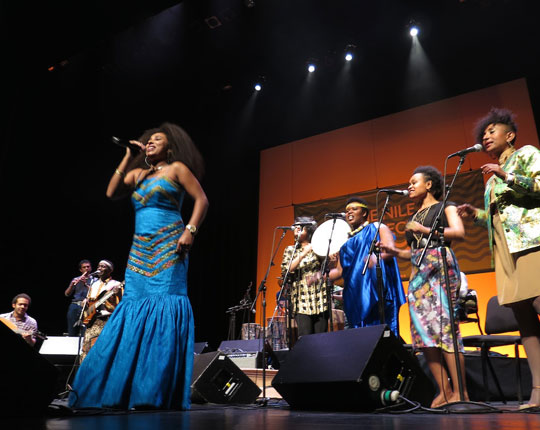Blog May 7, 2015
The Nile Project: Curtain Call at Princeton
The Nile Project’s 2015 U.S. tour ended at Princeton University on May 2. This was the last concert of a four-month tour that began in New York City’s globalFEST in January. I saw both shows, and there was no mistaking the growth and evolution over the course of a long winter romp around the country. The Nile Project is unusual in so many ways: its scope and ambition, its shifting cast of characters, and its powerful focus, not on an artist, genre or country, but on an entire region, and one that is frequently overlooked in the global music pantheon.
Start with that last point. One often hears that East Africa is overshadowed by a proliferation of artists, tours and music releases from West and southern Africa. As I’ve written before, this is no accident. Americans and Europeans have an intuitive affinity for West and Central African music owing to deep cultural connections stemming from the legacy of the Afro-Atlantic slave trade. Our musics share DNA, and whether we think about it or not, we feel those connections, be it in the affinities between American blues and folk and the music of the West African Sahel, or between Latin music and the old and new traditions of the Congo region. With South Africa, the story is different, but the result is similar. South African musicians have looked to the United States as a model since at least the late 19th century, and so we sense a lot of familiar resonance in sounds from gospel to kwaito. Witness the instant success of Paul Simon’s Graceland among many other examples.
[caption id="attachment_22697" align="aligncenter" width="600"] Nile Project, curtain call (Eyre 2015)[/caption]
East Africa is decidedly more remote to our ears, and in recent decades this region has not benefited from as much love within the realm of “world music.” That is not to say the music is uninteresting. Far from it. And kudos to the creators of the Nile Project, especially co-founders Mina Girgis (ethnomusicologist) and Meklit Hadero (artist) and musical director Miles Jay for conceiving such a strong and vivid stage presentation of music from Sudan, Ethiopia, Kenya, Egypt, Uganda, Rwanda and Burundi.
The recent Nile Project concerts brilliantly leverage the talent and charm of strong individual artists, mostly women, such as Alsarah (Sudan), Dina El Wedidi (Egypt), Sophie Nzayisenga (Rwanda), and Salamnesh Zemene (Ethiopia). During a lengthy two-set performance, each of these artists has opportunities to take center stage and you can feel the music shift from the playful swing of Sudan, to the sultry, funky grooves of Ethiopia, the more subdued colors of Egyptian art music, and so on. The musical colors, like the artists’ personalities, speak for themselves—no explanation needed. And the ensemble has developed superb skills at delivering the nuances of each style without ever creating a muddle.
[caption id="attachment_22685" align="aligncenter" width="599"]
Nile Project, curtain call (Eyre 2015)[/caption]
East Africa is decidedly more remote to our ears, and in recent decades this region has not benefited from as much love within the realm of “world music.” That is not to say the music is uninteresting. Far from it. And kudos to the creators of the Nile Project, especially co-founders Mina Girgis (ethnomusicologist) and Meklit Hadero (artist) and musical director Miles Jay for conceiving such a strong and vivid stage presentation of music from Sudan, Ethiopia, Kenya, Egypt, Uganda, Rwanda and Burundi.
The recent Nile Project concerts brilliantly leverage the talent and charm of strong individual artists, mostly women, such as Alsarah (Sudan), Dina El Wedidi (Egypt), Sophie Nzayisenga (Rwanda), and Salamnesh Zemene (Ethiopia). During a lengthy two-set performance, each of these artists has opportunities to take center stage and you can feel the music shift from the playful swing of Sudan, to the sultry, funky grooves of Ethiopia, the more subdued colors of Egyptian art music, and so on. The musical colors, like the artists’ personalities, speak for themselves—no explanation needed. And the ensemble has developed superb skills at delivering the nuances of each style without ever creating a muddle.
[caption id="attachment_22685" align="aligncenter" width="599"]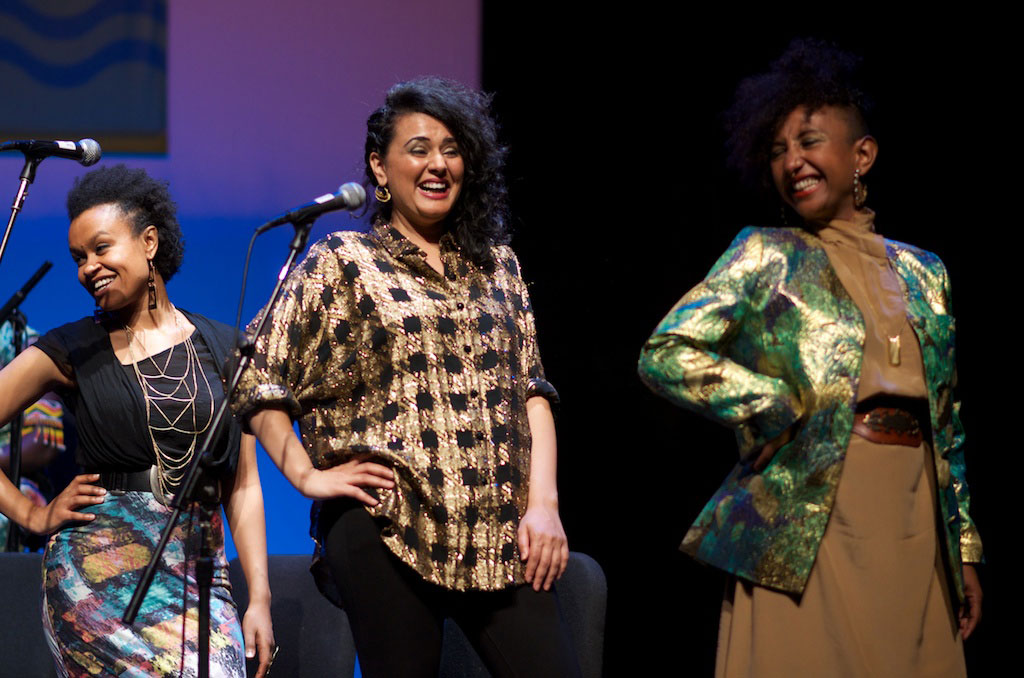 Meklit Hadero, Dina El Wedidi, Alsarah [/caption]
This is clearly the product of hard work. In their residencies, these musicians have carefully studied the details of each other’s styles and genres in order to deliver the right tonalities and cadences for each one. What also shows is the spirit of love, respect, camaraderie and just plain good fun that has developed among the artists. This must have been especially strongly felt in this, the final performance of a very long tour. It never hurts to feel that the artists you are watching perform are having the time of their lives, while delivering seductive and beautiful music at the same time.
Finally, I mentioned the women, who do dominate this show. But the men are also strong players. Egyptian oud virtuoso Mohamed Abozekry and kawala flute player Nader El Shaer clearly have a deep connection. Abozekry’s fiercely rhythmic lines underpin all the grooves in the show, and El Shaer’s meandering kawala melodies provide eloquent commentary throughout. Ethiopian saxophonist Jorga Mesfin delivers a performance worthy of the Ethiopiques CD series, especially when interacting with Zemene’s smoldering vocal. Percussionists from Burundi and Egypt create remarkable synergies, in league with Kasiva Mutua, a striking and unusual female percussionist from Kenya.
[caption id="attachment_22686" align="aligncenter" width="599"]
Meklit Hadero, Dina El Wedidi, Alsarah [/caption]
This is clearly the product of hard work. In their residencies, these musicians have carefully studied the details of each other’s styles and genres in order to deliver the right tonalities and cadences for each one. What also shows is the spirit of love, respect, camaraderie and just plain good fun that has developed among the artists. This must have been especially strongly felt in this, the final performance of a very long tour. It never hurts to feel that the artists you are watching perform are having the time of their lives, while delivering seductive and beautiful music at the same time.
Finally, I mentioned the women, who do dominate this show. But the men are also strong players. Egyptian oud virtuoso Mohamed Abozekry and kawala flute player Nader El Shaer clearly have a deep connection. Abozekry’s fiercely rhythmic lines underpin all the grooves in the show, and El Shaer’s meandering kawala melodies provide eloquent commentary throughout. Ethiopian saxophonist Jorga Mesfin delivers a performance worthy of the Ethiopiques CD series, especially when interacting with Zemene’s smoldering vocal. Percussionists from Burundi and Egypt create remarkable synergies, in league with Kasiva Mutua, a striking and unusual female percussionist from Kenya.
[caption id="attachment_22686" align="aligncenter" width="599"]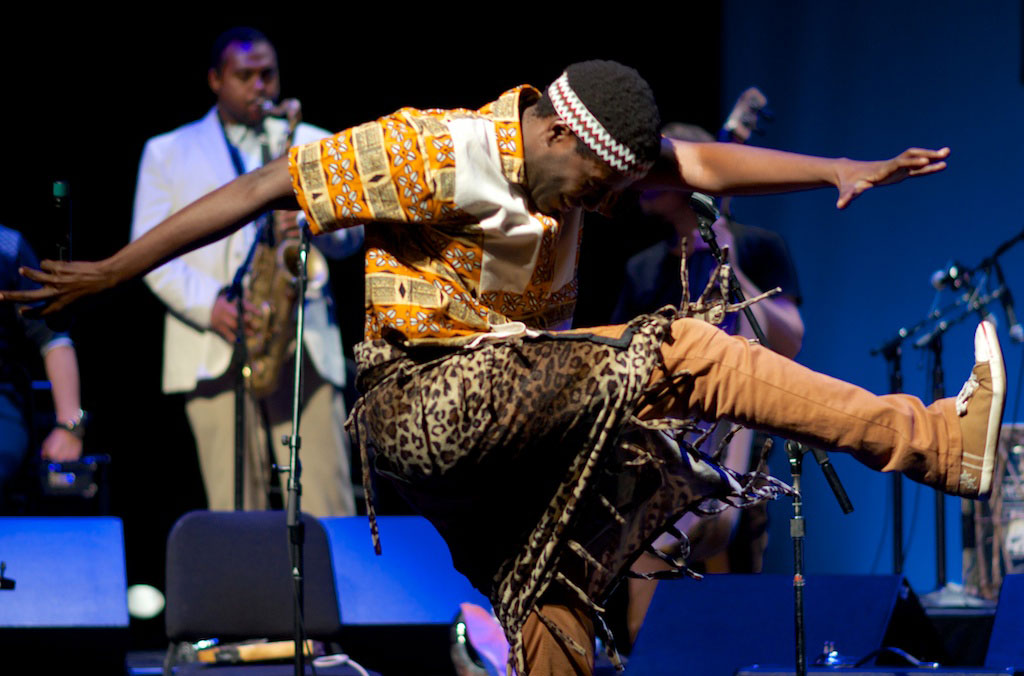 Steven Sogo [/caption]
But special mention has to go to the most charismatic man on the stage, Steven Sogo of Burundi. Whether on bass guitar, a local thumb piano or vocals, or whether exhorting the crowd to sing in three-part harmony, or dance in wild, improvised moves, this guy really knows how to work a crowd.
The Nile Project is in fact about much more than music. It is a multidisciplinary operation aimed ultimately at bringing about greater cooperation among the 11 nations bordering the river so that they can create better water management policies. Approaching such a daunting political and environmental challenge from the standpoint of music and dance is nothing short of revolutionary. And this latest tour has clearly advanced the cause.
Photos by Banning Eyre
Hear Banning’s NPR preview of the Nile Project tour.
[caption id="attachment_22687" align="aligncenter" width="606"]
Steven Sogo [/caption]
But special mention has to go to the most charismatic man on the stage, Steven Sogo of Burundi. Whether on bass guitar, a local thumb piano or vocals, or whether exhorting the crowd to sing in three-part harmony, or dance in wild, improvised moves, this guy really knows how to work a crowd.
The Nile Project is in fact about much more than music. It is a multidisciplinary operation aimed ultimately at bringing about greater cooperation among the 11 nations bordering the river so that they can create better water management policies. Approaching such a daunting political and environmental challenge from the standpoint of music and dance is nothing short of revolutionary. And this latest tour has clearly advanced the cause.
Photos by Banning Eyre
Hear Banning’s NPR preview of the Nile Project tour.
[caption id="attachment_22687" align="aligncenter" width="606"]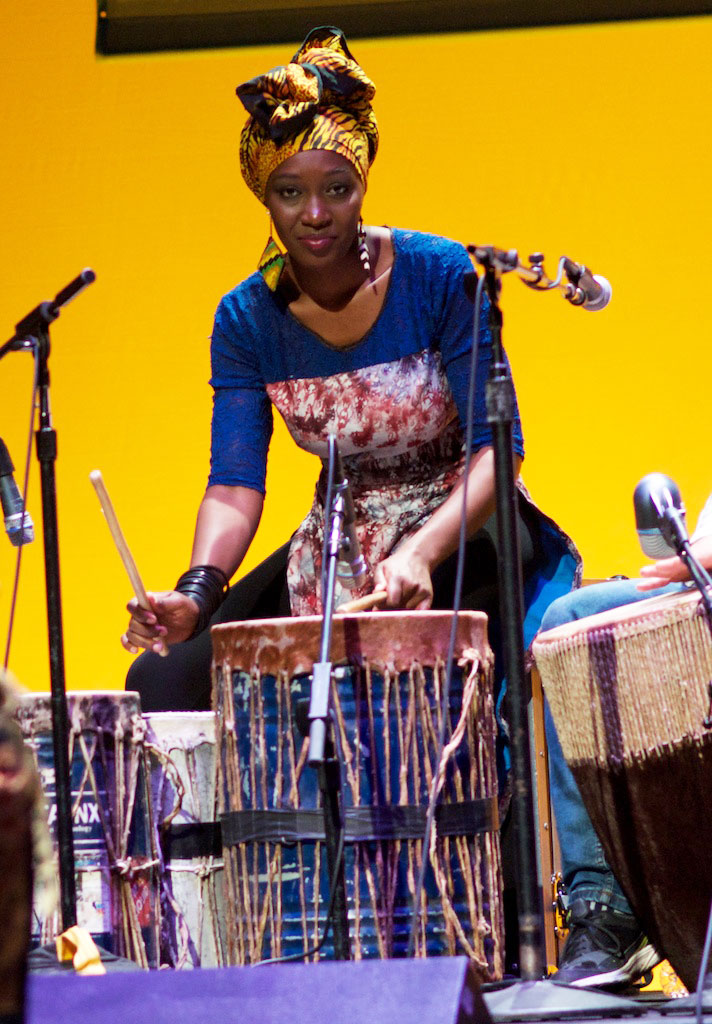 Kasiva Mutua[/caption]
[caption id="attachment_22690" align="aligncenter" width="598"]
Kasiva Mutua[/caption]
[caption id="attachment_22690" align="aligncenter" width="598"]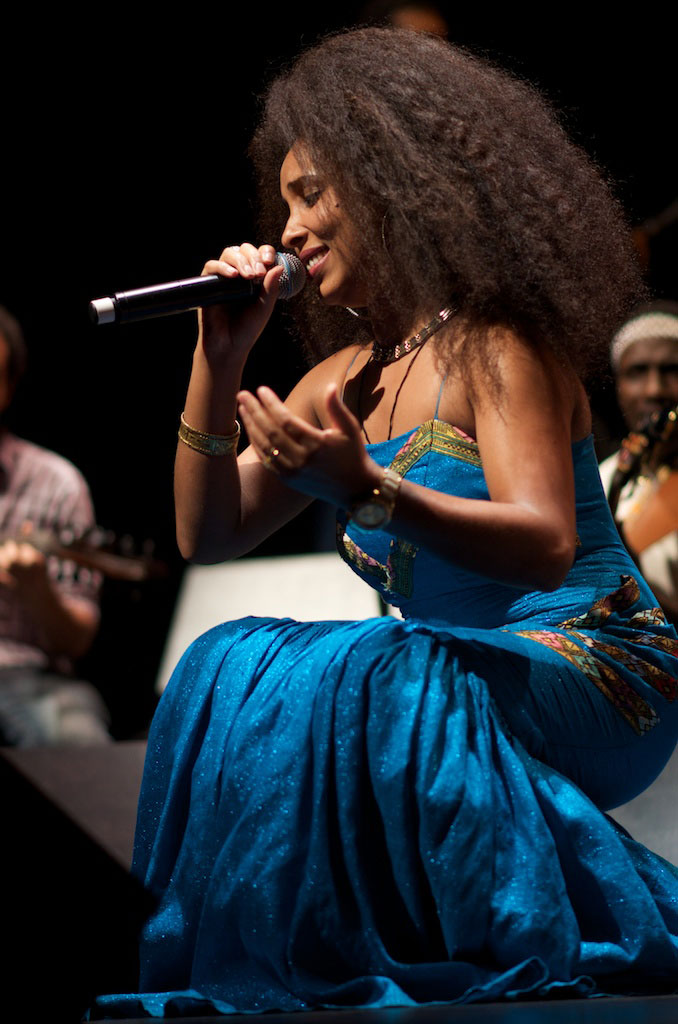 Salamnesh Zemene [/caption]
[caption id="attachment_22683" align="aligncenter" width="597"]
Salamnesh Zemene [/caption]
[caption id="attachment_22683" align="aligncenter" width="597"]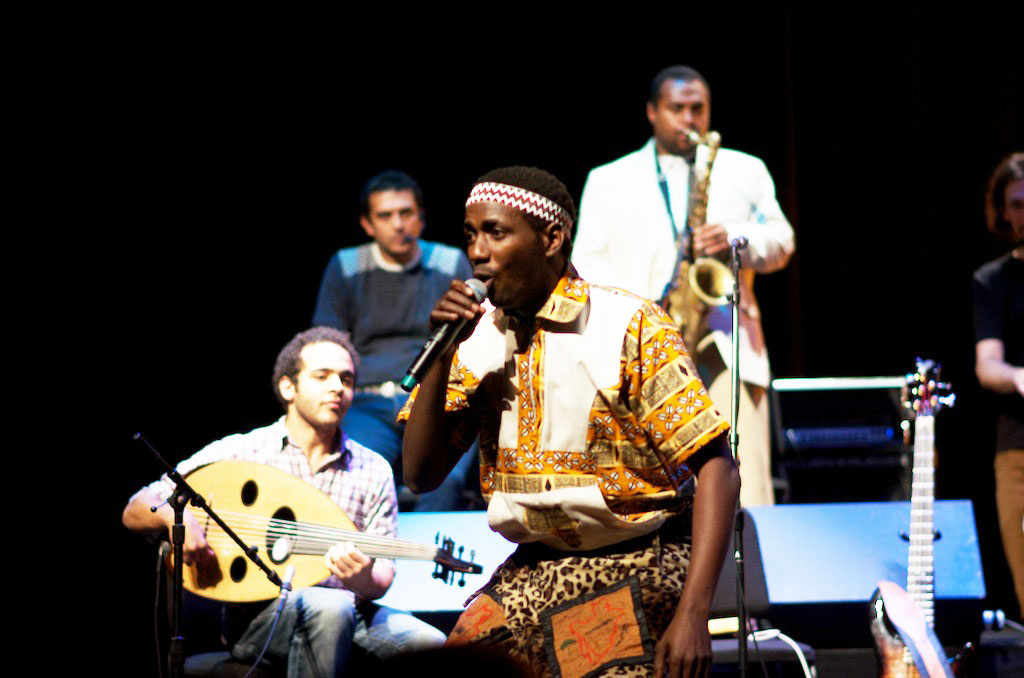 Mohamed Abozekry, Nader El Shaer, Steven Sogo, Jorga Mesfin[/caption]
[caption id="attachment_22680" align="aligncenter" width="600"]
Mohamed Abozekry, Nader El Shaer, Steven Sogo, Jorga Mesfin[/caption]
[caption id="attachment_22680" align="aligncenter" width="600"]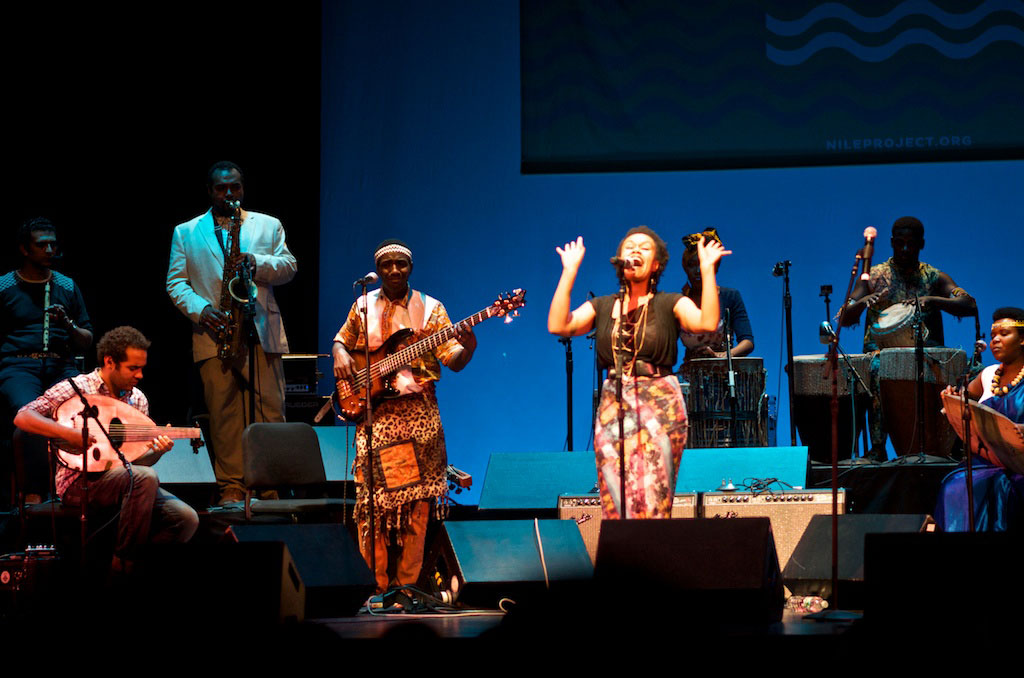 Meklit Hadero, center stage[/caption]
[caption id="attachment_22678" align="aligncenter" width="599"]
Meklit Hadero, center stage[/caption]
[caption id="attachment_22678" align="aligncenter" width="599"]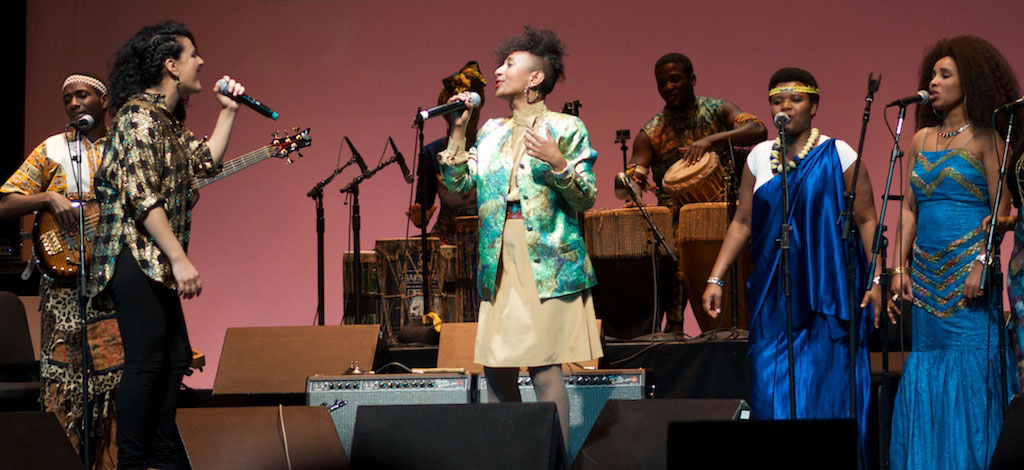 Dina El Wedidi, Alsarah, Sophie Nzayisenga, Salamnesh Zemene[/caption]
[caption id="attachment_22681" align="aligncenter" width="589"]
Dina El Wedidi, Alsarah, Sophie Nzayisenga, Salamnesh Zemene[/caption]
[caption id="attachment_22681" align="aligncenter" width="589"]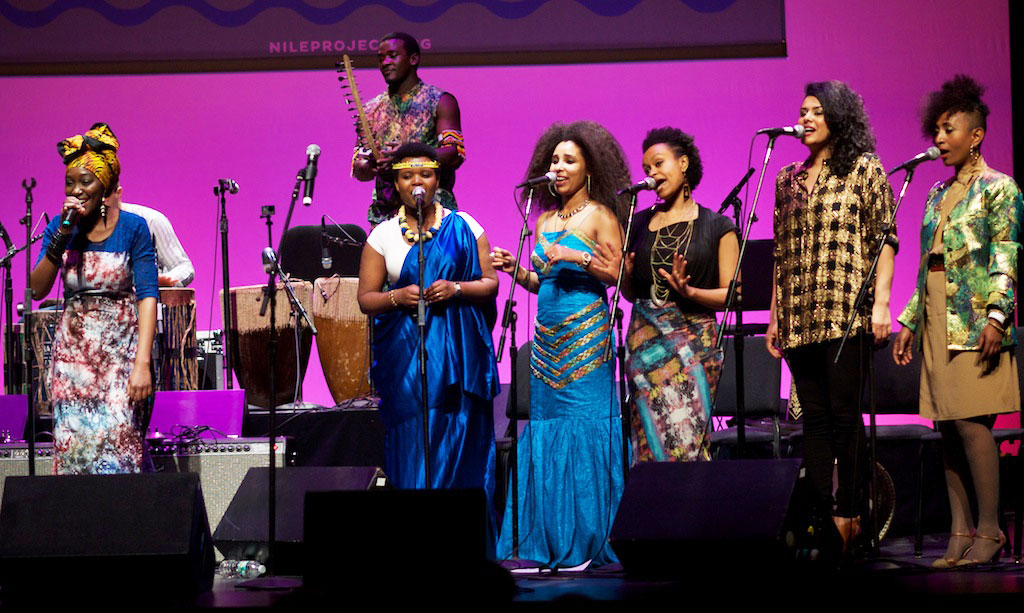 Kasiva, Sophie, Salamnesh, Meklit, Dina, Alsarah[/caption]
Kasiva, Sophie, Salamnesh, Meklit, Dina, Alsarah[/caption]
 Nile Project, curtain call (Eyre 2015)[/caption]
East Africa is decidedly more remote to our ears, and in recent decades this region has not benefited from as much love within the realm of “world music.” That is not to say the music is uninteresting. Far from it. And kudos to the creators of the Nile Project, especially co-founders Mina Girgis (ethnomusicologist) and Meklit Hadero (artist) and musical director Miles Jay for conceiving such a strong and vivid stage presentation of music from Sudan, Ethiopia, Kenya, Egypt, Uganda, Rwanda and Burundi.
The recent Nile Project concerts brilliantly leverage the talent and charm of strong individual artists, mostly women, such as Alsarah (Sudan), Dina El Wedidi (Egypt), Sophie Nzayisenga (Rwanda), and Salamnesh Zemene (Ethiopia). During a lengthy two-set performance, each of these artists has opportunities to take center stage and you can feel the music shift from the playful swing of Sudan, to the sultry, funky grooves of Ethiopia, the more subdued colors of Egyptian art music, and so on. The musical colors, like the artists’ personalities, speak for themselves—no explanation needed. And the ensemble has developed superb skills at delivering the nuances of each style without ever creating a muddle.
[caption id="attachment_22685" align="aligncenter" width="599"]
Nile Project, curtain call (Eyre 2015)[/caption]
East Africa is decidedly more remote to our ears, and in recent decades this region has not benefited from as much love within the realm of “world music.” That is not to say the music is uninteresting. Far from it. And kudos to the creators of the Nile Project, especially co-founders Mina Girgis (ethnomusicologist) and Meklit Hadero (artist) and musical director Miles Jay for conceiving such a strong and vivid stage presentation of music from Sudan, Ethiopia, Kenya, Egypt, Uganda, Rwanda and Burundi.
The recent Nile Project concerts brilliantly leverage the talent and charm of strong individual artists, mostly women, such as Alsarah (Sudan), Dina El Wedidi (Egypt), Sophie Nzayisenga (Rwanda), and Salamnesh Zemene (Ethiopia). During a lengthy two-set performance, each of these artists has opportunities to take center stage and you can feel the music shift from the playful swing of Sudan, to the sultry, funky grooves of Ethiopia, the more subdued colors of Egyptian art music, and so on. The musical colors, like the artists’ personalities, speak for themselves—no explanation needed. And the ensemble has developed superb skills at delivering the nuances of each style without ever creating a muddle.
[caption id="attachment_22685" align="aligncenter" width="599"] Meklit Hadero, Dina El Wedidi, Alsarah [/caption]
This is clearly the product of hard work. In their residencies, these musicians have carefully studied the details of each other’s styles and genres in order to deliver the right tonalities and cadences for each one. What also shows is the spirit of love, respect, camaraderie and just plain good fun that has developed among the artists. This must have been especially strongly felt in this, the final performance of a very long tour. It never hurts to feel that the artists you are watching perform are having the time of their lives, while delivering seductive and beautiful music at the same time.
Finally, I mentioned the women, who do dominate this show. But the men are also strong players. Egyptian oud virtuoso Mohamed Abozekry and kawala flute player Nader El Shaer clearly have a deep connection. Abozekry’s fiercely rhythmic lines underpin all the grooves in the show, and El Shaer’s meandering kawala melodies provide eloquent commentary throughout. Ethiopian saxophonist Jorga Mesfin delivers a performance worthy of the Ethiopiques CD series, especially when interacting with Zemene’s smoldering vocal. Percussionists from Burundi and Egypt create remarkable synergies, in league with Kasiva Mutua, a striking and unusual female percussionist from Kenya.
[caption id="attachment_22686" align="aligncenter" width="599"]
Meklit Hadero, Dina El Wedidi, Alsarah [/caption]
This is clearly the product of hard work. In their residencies, these musicians have carefully studied the details of each other’s styles and genres in order to deliver the right tonalities and cadences for each one. What also shows is the spirit of love, respect, camaraderie and just plain good fun that has developed among the artists. This must have been especially strongly felt in this, the final performance of a very long tour. It never hurts to feel that the artists you are watching perform are having the time of their lives, while delivering seductive and beautiful music at the same time.
Finally, I mentioned the women, who do dominate this show. But the men are also strong players. Egyptian oud virtuoso Mohamed Abozekry and kawala flute player Nader El Shaer clearly have a deep connection. Abozekry’s fiercely rhythmic lines underpin all the grooves in the show, and El Shaer’s meandering kawala melodies provide eloquent commentary throughout. Ethiopian saxophonist Jorga Mesfin delivers a performance worthy of the Ethiopiques CD series, especially when interacting with Zemene’s smoldering vocal. Percussionists from Burundi and Egypt create remarkable synergies, in league with Kasiva Mutua, a striking and unusual female percussionist from Kenya.
[caption id="attachment_22686" align="aligncenter" width="599"] Steven Sogo [/caption]
But special mention has to go to the most charismatic man on the stage, Steven Sogo of Burundi. Whether on bass guitar, a local thumb piano or vocals, or whether exhorting the crowd to sing in three-part harmony, or dance in wild, improvised moves, this guy really knows how to work a crowd.
The Nile Project is in fact about much more than music. It is a multidisciplinary operation aimed ultimately at bringing about greater cooperation among the 11 nations bordering the river so that they can create better water management policies. Approaching such a daunting political and environmental challenge from the standpoint of music and dance is nothing short of revolutionary. And this latest tour has clearly advanced the cause.
Photos by Banning Eyre
Hear Banning’s NPR preview of the Nile Project tour.
[caption id="attachment_22687" align="aligncenter" width="606"]
Steven Sogo [/caption]
But special mention has to go to the most charismatic man on the stage, Steven Sogo of Burundi. Whether on bass guitar, a local thumb piano or vocals, or whether exhorting the crowd to sing in three-part harmony, or dance in wild, improvised moves, this guy really knows how to work a crowd.
The Nile Project is in fact about much more than music. It is a multidisciplinary operation aimed ultimately at bringing about greater cooperation among the 11 nations bordering the river so that they can create better water management policies. Approaching such a daunting political and environmental challenge from the standpoint of music and dance is nothing short of revolutionary. And this latest tour has clearly advanced the cause.
Photos by Banning Eyre
Hear Banning’s NPR preview of the Nile Project tour.
[caption id="attachment_22687" align="aligncenter" width="606"] Kasiva Mutua[/caption]
[caption id="attachment_22690" align="aligncenter" width="598"]
Kasiva Mutua[/caption]
[caption id="attachment_22690" align="aligncenter" width="598"] Salamnesh Zemene [/caption]
[caption id="attachment_22683" align="aligncenter" width="597"]
Salamnesh Zemene [/caption]
[caption id="attachment_22683" align="aligncenter" width="597"] Mohamed Abozekry, Nader El Shaer, Steven Sogo, Jorga Mesfin[/caption]
[caption id="attachment_22680" align="aligncenter" width="600"]
Mohamed Abozekry, Nader El Shaer, Steven Sogo, Jorga Mesfin[/caption]
[caption id="attachment_22680" align="aligncenter" width="600"] Meklit Hadero, center stage[/caption]
[caption id="attachment_22678" align="aligncenter" width="599"]
Meklit Hadero, center stage[/caption]
[caption id="attachment_22678" align="aligncenter" width="599"] Dina El Wedidi, Alsarah, Sophie Nzayisenga, Salamnesh Zemene[/caption]
[caption id="attachment_22681" align="aligncenter" width="589"]
Dina El Wedidi, Alsarah, Sophie Nzayisenga, Salamnesh Zemene[/caption]
[caption id="attachment_22681" align="aligncenter" width="589"] Kasiva, Sophie, Salamnesh, Meklit, Dina, Alsarah[/caption]
Kasiva, Sophie, Salamnesh, Meklit, Dina, Alsarah[/caption]






